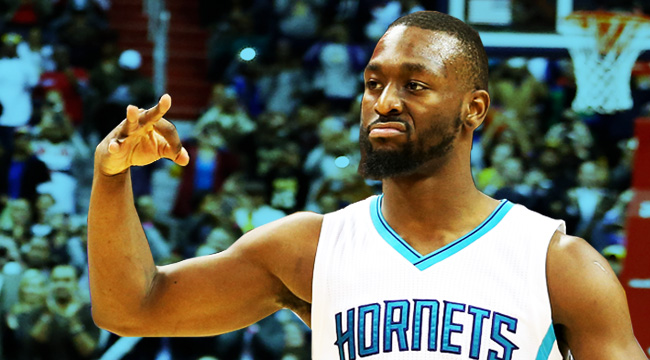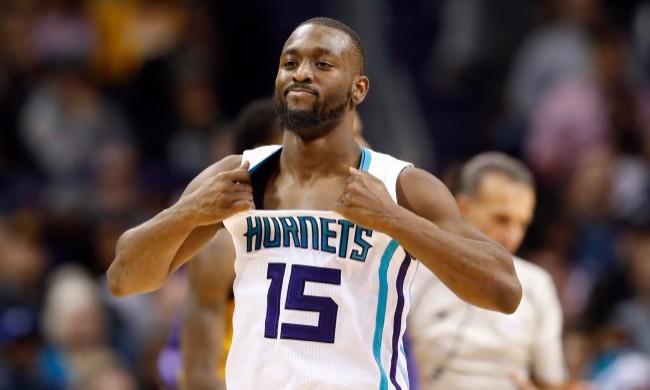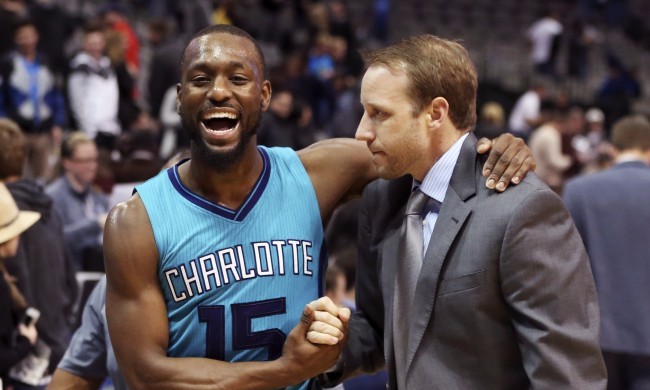
Kemba Walker is a player that has been dogged by claims that he can’t cut it for his entire career. He was undersized coming out of high school but overcame that to be recruited by major programs like Cincinnati and St. Johns before committing to UConn. Once he made it to college, even in a program that is a veritable point guard star-making machine, he had to deal with the cycle of underestimation all over again.
Of course, once Walker was able to craft his skills around his limitations rather than trying to make himself into a completely different player he put many of those criticisms to rest. Most notably, in 2011 he won every tournament game – the Maui Invitational, Big East, and NCAA tournaments – UConn participated in, sometimes putting the team on his back and cementing a win all by himself. It quieted the detractors for a time, but the very next year Kemba entered the league as the ninth pick in the NBA draft and found a home with the Charlotte Hornets (neé Bobcats).
Despite his numerous accomplishments he dealt with what many quality college players have to overcome as NBA rookies, in that his ability to adapt his skills to a higher level of play was second guessed and there was talk of whether Charlotte made the right choice when deciding on a potential cornerstone for the then-struggling team.
So yes, Kemba has been dealing with criticisms of his play and doubts about his progress for quite some time.
The knocks against his contributions as a player haven’t truly stopped since he entered the league, with concerns over his vision and command of the floor remaining in the mix no matter what he does. Pre-draft assessments complimented his mid-range shooting ability and his speed – which remain two of his most important assets – but also expressed concerns over his size and whether he could find a place in an NBA system where his “out of control play” would be a bigger liability.
Walker discussed some of his shortfalls with SB Nation back in 2014, admitting that he’s “at a disadvantage a lot of times with kind of everything. On the defensive end, offensively just trying to get my shot off and things like that, strength, going against bigger point guards, stuff like that.”

In the same conversation, Kemba also made it clear that just as he had at the previous two levels of the sport, he would continue to “get better, each and every year, each and every day.” Of course, when the Hornets granted him a four-year, $48 million deal in 2014 that price tag placed a spotlight on all of the ways he was supposedly still falling short, and the question of whether he was actually getting better each year didn’t seem to matter as much.
However, the talk about how underrated Kemba is in the league hasn’t abated either. He made Bleacher Report’s All-Underrated NBA team in 2013 (the season the Hornets finished with a dismal record of 21-61) off the strength of his 17.7 points and 5.7 assists per game. As recently as this fall, an NBA Reddit thread titled “Is Kemba Walker underrated?” chalked the minimizing of his talents up to the sheer amount of amazing guards in the league right now. User “GO30tv” argued that if he were on a team like the Celtics he would consistently be in the conversation as one of the best guards in the league or at least brought up in the argument more often, and others in the thread agreed.
Both sides of the conversation about Kemba Walker have in a sense been competing against each other from the beginning of his time in the league. It could be argued, after so many years of Kemba constantly being seen as either one of the most underrated or most overpaid players in the league, with no in-between, that such talk is now actively overshadowing how fun it is to watch him play. He’s grown into the type of player who people immediately worry about not having on the court as soon as even the slightest specter of a serious injury appears, as it did recently when Walker tweaked his knee and it looked for a moment as if he could be out for the season.
While his team might play into things on some level, other small market players get attention on the national stage without half of Kemba’s flashy highlights. Through 27 games played this season he’s averaging 1.5 more points per game than his 2015-2016 average, while keeping his turnovers and foul numbers even. He ranks eighth among qualified point guards in PER and has a 5.2 EWA on top of that.
In a win over the Lakers on Tuesday, Walker did what he often does – led his team in a second half comeback – with 28 points, 10 assists, and eight rebounds to help seal the win.
As CBS Sports’ Matt Moore notes on Twitter, Kemba also has some surprising stats that almost seem unreal before you dig into the details.
https://twitter.com/HPbasketball/status/811332398659043328
Kemba does things that make jaws drop and the constant back and forth about his overrated/underrated status completely misses the fact that he’s simply a joy to watch. With the Hornets now in fourth place in the East and just a half game back from Boston, somehow every great highlight of Kemba’s reignites the conversation about where he should be ranked among the league’s point guards. Some of that is almost certainly a case of the NBA hot take machine getting completely out of hand at the drop of a hat.

But it all coalesces into a situation where Walker is never unanimously on one side of the underrated conversation or the other, wherein his impressive talents are taken for granted instead of people simply marveling at the excitement of his energetic and ankle-breaking play.
As Charlotte looks ahead to making an actual run in the playoffs this year, Walker is also on the cusp of breaking out of this unorthodox cycle and finally achieving a level of recognition that has previously eluded him. It might not mean he goes to the All-Star Game, but he deserves to at least have a status where we no longer have awesome highlight-triggering rounds of “that was awesome but how good is he really?”
Instead, people can just watch this …
or this …
or this …
… and freak out about how good Kemba is when his game is clicking.
When asked by CBS Sports whether it’s really just taken him a few years to settle into league play, Walker replied “It takes a while. When you come out of college, you’re accustomed to one speed. That’s how it was for me. Now that I’m just older, and smarter, and been in the league, and really understanding it and understanding the game better.”
His higher profile this season may very well be a result of him finally being completely comfortable on the court, but there are naysayers who will always underestimate his possible potential and fans on the other side who will continue to bang the “underrated” drum if this is indeed where his career plateaus.
One thing’s for sure – it’s at least time to stop taking his awesome moments on the court for granted and let him entertain you.






